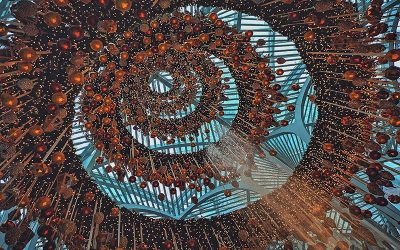Over the past couple of weeks, we have been focused upon establishing a natural rhythm to the time devoted to the creative endeavor. I have encouraged you to determine some sort of schedule for yourself – a window set aside specifically to engage with the artistic process. This can either be a piece of time snatched from our busy schedules each day or spread out over a week. No matter how you structure this creative period, make a commitment to follow through on it.
This week I want to dive into the philosophy behind such an approach. In a recent interview, Dan Siegel, a clinical professor at UCLA Medical School and founder of a field called interpersonal neurobiology, discussed the value of the concept of aspiration. He believes that once we develop the proper mindset, then mental processes run much more efficiently and offer more reward for the individual. Nowhere is this reaction clearer than within the creative endeavor.
Siegel encourages us to look beyond the tensions generated by the fragile self and instead focus upon the emergent reality of the mind. In each moment, we are creating our next step forward. Nothing is set in stone. Radical departure from our old way of being is possible. Siegel discusses how past behaviors tend to concretize our thoughts, but this cause-and-effect is nothing more than a false construction of conscious thought. Dive down deeper. Get in touch with the possibility that you will discover a more beneficial relationship with your creative self, in the next instant.
The renowned art critic John Berger was once considering Rembrandt’s artistic career. He observed that “every exceptional work is the result of a prolonged successful struggle.” I want to unpack this statement and see how it relates to Siegel’s conclusions. Of course, we all want to produce “exceptional” work. We are striving to bring something of beauty, however we may define that term, into the world. But what do we do with the notion of a “successful” result.? Success only comes to the fore after the creative endeavor has been fully birthed. The merits of a work of art only fully reveal themselves once the paint brush or writing pen has been put down for the final time. The effect can be immediate too. In that moment of resolution, we can even give ourselves over to marveling at what has been created.
Berger was looking at Rembrandt’s artistic progression in hindsight, however, when he could readily perceive the impact of the work. Oftentimes, when we are immersed in the creative process, the aspiration for artistic success seems to become a source of tension within what Siegel refers to as the “prison” of the constrained self. We need to reduce expectations while in the production phase of our creative endeavor. The notion of outcome within any artistic project should be minimized within the mind.
We cannot concern ourselves with the result of any prolonged struggle. We must look upon the creative endeavor more impersonally. We are not solely responsible for the outcome. Siegel refers to this process as a source of mystery. He marvels at the direction all his writing projects take over time, as he applies himself to the production of the pages in a more open and emergent manner. He describes himself as a vessel for the book’s creation. He is often more surprised than anyone else just what exactly jumps from his pen. He finds that he enters a special space of playfulness within those periods of time he devotes to the book’s creation.
Here is a way into that playful space: work consistently and adhere to whatever goal you have established for yourself. The psyche then begins to anticipate producing work, whether that is musical notes on the page or brushstrokes or physical movement across the dance floor. Keep to a schedule during these formative months when the work is just beginning to see the light of day. If you respond to the creative endeavor with discipline, then the artistry that you are pulling from the overarching void can flourish.
All the chatter that often sits right at the fore of our minds quiets when we work with a preset schedule. The work period doesn’t have to be much either. Reduce the perception that this endeavor is a Herculean task. Separate the process into finite tasks – one step follows another – you lay down one line of prose or model a bit of clay, and then follow with another distinct action. Just observe your hand tracing letters on the page, if you are a writer, for example. You are just moving through this process of discovery, almost as if you are an observer of it, watching it unfold.
Do not convince yourself that this is conceptually tricky – it is as simple as taking a few tentative steps and reaching out to the horizon where the unknown comes into focus. Make a game of it, see how far you can reach out into the emerging present without reflection or pondering just how it all might be working out. Reduce expectation and maintain the schedule you set for yourself. You will be rewarded over time.




